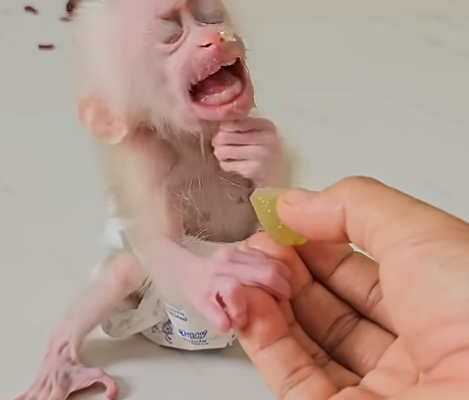When a baby monkey is feeling stressed, it’s essential to address the issue promptly and effectively to ensure the well-being of the young primate. Stress in baby monkeys can arise from various factors, including changes in environment, separation from their mothers, social conflicts, or health issues. Here are several steps to take when managing stress in a baby monkey:
- Create a Safe Environment: Ensure the baby monkey has a secure, quiet, and comfortable space. Reducing loud noises, unfamiliar scents, and sudden movements can help create a calming atmosphere. A cozy, warm environment with familiar toys or objects can provide comfort.
- Maintain Consistency: Monkeys thrive on routine. Keeping a consistent daily schedule for feeding, playtime, and sleep can help reduce anxiety. Abrupt changes in their environment or routine can exacerbate stress.
- Physical Comfort: Physical touch and comfort are crucial for baby monkeys. Holding, cuddling, and gently stroking them can provide reassurance and a sense of security. If the baby monkey is orphaned or separated from its mother, using a soft cloth or toy as a surrogate can mimic the warmth and comfort of maternal contact.
- Proper Nutrition: Ensuring the baby monkey receives proper nutrition is vital. Stress can affect their appetite, so offering their favorite foods and ensuring they are well-hydrated can help. Nutritional supplements might be necessary if the monkey is not eating well.
- Social Interaction: Monkeys are social animals and need interaction. If possible, ensure the baby monkey has social opportunities with other monkeys or caregivers. Social bonds are crucial for their emotional well-being. Playtime with other young monkeys can also be beneficial.
- Monitor Health: Stress can sometimes be a symptom of underlying health issues. Regular veterinary check-ups are essential to rule out any medical problems that might be causing stress. Ensure the baby monkey is up-to-date on vaccinations and parasite control.
- Enrichment Activities: Providing mental and physical stimulation through enrichment activities can help distract the baby monkey from stress. Toys, puzzles, and opportunities for climbing and exploration can keep them engaged and reduce anxiety.
- Professional Guidance: If the stress persists, seeking advice from a primatologist or a veterinarian specializing in primates can be invaluable. They can offer specific strategies and interventions tailored to the individual monkey’s needs.
Addressing stress in a baby monkey requires a holistic approach that combines environmental adjustments, physical comfort, social interaction, and professional care. By being attentive and responsive to the baby monkey’s needs, caregivers can help alleviate stress and promote a healthy, happy development.
